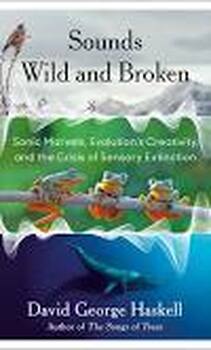Haskell’s latest book, Sounds Wild and Broken: Sonic Marvels, Evolution’s Creativity, and the Crisis of Sensory Extinction, discusses the origin of sound made by animals and how the human inner ear evolved to hear sound. Haskell begins his story before sound was sound. He states that “the cilium was life’s first sense organ, our first antenna into the beyond. Ciliary hairs functioned like crude motors, but they also absorbed surrounding sound waves, passing information into the cell walls.” He takes all of us on the journey of auditory evolution through time until the present.
Haskell traces sound in relation to deforestation and habitat loss. He shows the correlation between the way humans and animals communicate and continues to evolve based on the expanding problem of noise pollution. The story could be told as one of the upending crises as animals must try to out-compete human sound, but Haskell tells the extraordinary story of triumph as all organisms continue to evolve and change. Comments are closed.
|
Reading CornerPlease send your book ideas to the Reading Corner. 
Categories
All
Archives
February 2023
|

 RSS Feed
RSS Feed